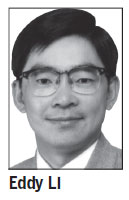The feasibility of a wholesale market
Updated: 2012-11-15 07:02
By Eddy Li(HK Edition)
|
|||||||||

The Hong Kong Polytechnic University will conduct strategic research on "creating a professional wholesale market in Hong Kong". The research is subsidized by the SME Development Fund of the Trade and Industry Department.
That it's essential for Hong Kong to develop its wholesale market has been circulating among business circles for years. There was no response from the government, however, until Leung Chun-ying assumed office as chief executive. The new HKSAR government is finally willing to provide financial support to the project. It is also a fulfillment of a promise in CY Leung's manifesto that the government will take steps to promote wholesale businesses.
It is universally acknowledged that our city is eligible for developing a wholesale market - we can obtain a large amount of resources from the mainland; we have extremely convenient transportation both within the city and points beyond. Our system of commercial law is well-defined. We have a reputable business environment. All these advantages have already qualified Hong Kong to be a major distributing center.
According to a preliminary study, five wholesale businesses are unique to certain districts, including apparel and textiles in Cheung Sha Wan, jewelry in Hung Hom, electronics in Sham Shui Po, miscellaneous goods in Kwun Tong, and furnishings in Wong Chuk Hang.
The proposal for a professional wholesale market was put forward in the first place for its commercial value and feasibility, but inevitably, developing that market is a subjective matter. In this case, the government should entrust an academic institution to carry out objective research to assess the feasibility of developing a market in the five categories, using data from different dimensions and actual conditions.
Some would ask about the economic returns. There is no existing data, but we can use the figures from neighboring areas for reference. Guzhen Town in Zhongshan is dubbed as the China Lighting Capital. With a population of only 150,000, there are as many as 7,497 lighting merchants in the town and the products are popular worldwide. Last year, the gross product of its lighting fitting and equipment industries reached 17.08 billion yuan and the total export was 3.5 billion yuan. Humen Town, within the borders of Dongguan city, is a thriving city crowded with consumer goods factories, especially famous for its apparel industry. Till the end of 2011, there were 2,346 manufacturing and apparel processing enterprises in the town, employing 200,000 workers, producing a gross industrial output value of 20 billion yuan.
Businessmen are urging that Hong Kong become a professional wholesale market. This is not only for their own interests, but in the expectation of developing the entire economy with increased employment, if the project is successful. Since the 1970s, the labor-intensive manufacturing industry was moved northward on a large scale, creating intricate influences on the city: on the one hand, Hong Kong is becoming transformed into a service-oriented city, coordinating with the manufacturers in Guangdong to boost a bilateral economy; on the other hand, Hong Kong has failed to open up industries that are technology or capital intensive, resulting in large population of unqualified, semi-skilled and unskilled workers. The current major social contradiction is the low-income stratum's difficulty in finding proper jobs. The development of wholesale markets can solve the problem; furthermore, it will also lead to an abatement of popular discontent.
Although highly industrialized, Hong Kong's SMEs account for more than 90 percent of the city's companies. With 300,000 enterprises employing more than a million people, these are the backbone of our economy. However, in the face of economic recession in Western countries, many SMEs are struggling to survive. So the general hope is that the research on a professional wholesale market can propose concrete suggestions to the development of certain wholesale markets for small companies to follow.
The project is also propitious for the revitalization of old factories. Hong Kong has too little land for distribution, so to use the old industrial buildings with low usage would promote the wholesale market and at the same time save public resources.
The author is vice-president of the Chinese Manufacturers' Association of Hong Kong.
(HK Edition 11/15/2012 page3)